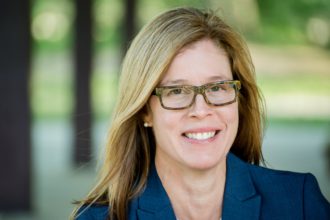On Sept. 14, Mayor Esther Manheimer announced that she’d been backed by five of the six sitting Council members, claiming that the joint endorsement “may be the first of its kind in Asheville.”
The only Council member not to jump on the Manheimer bandwagon was Kim Roney — understandably, given that Roney is the mayor’s opponent. The two have often been on opposing sides inside Council chambers as well, with Roney voting against Manheimer on issues such as the city’s fiscal year 2022-23 budget and new open space rules for development.
The two candidates dominated May’s five-way mayoral primary, with Manheimer taking 42.3% of the vote and Roney 33.4%. But those results show Roney to be a far stronger challenger than any Manheimer faced during her 2017 reelection campaign, when she earned 77% of votes in a four-way primary.
The incumbent has largely campaigned on her record, particularly emphasizing her management of the city through the COVID-19 pandemic. Meanwhile, Roney has criticized city government for a lack of transparency and disregard for public input.
The name of each candidate is linked to their responses in the post.
Esther Manheimer
Website: VoteManheimer.com
Occupation: Attorney, partner with the Van Winkle Law Firm
Previous candidacy or offices held: Mayor (2013-Present), Vice Mayor (2011-13), Asheville City Council (2009-11)
Key endorsements: Five of the six current Asheville City Council members, Asheville Firefighters Association, Progressive Democrats, Sierra Club, Buncombe County Commissioner Jasmine Beach-Ferrara
Amount of money raised: $23,206.25
Top three donors: Mack Pearsall, Clarissa Marshall, Tod Leaven
 Why should Asheville voters support you over your opponent? Trusted leadership brings people together. Together is how we create opportunities for our residents. Becoming a trusted leader takes time, listening skills and a collaborative mindset. That’s what I bring each day as mayor, whether I’m negotiating the most equitable budget in our history, welcoming a new living-wage employer or representing our city at the White House. I listen, learn and apply it to better serving our community. I ask for your vote so we can achieve more together.
Why should Asheville voters support you over your opponent? Trusted leadership brings people together. Together is how we create opportunities for our residents. Becoming a trusted leader takes time, listening skills and a collaborative mindset. That’s what I bring each day as mayor, whether I’m negotiating the most equitable budget in our history, welcoming a new living-wage employer or representing our city at the White House. I listen, learn and apply it to better serving our community. I ask for your vote so we can achieve more together.
How would you define Asheville’s regional role in Western North Carolina? At our best, Asheville is a leader for positive change, as we have been for LGBTQ equality, equity and sustainability during my leadership. Asheville is the hub for our regional economy, and as mayor, I see firsthand how the region depends on us to lead in the face of emergency climate disasters, high-speed fiber access, transportation planning and job recruitment and growth. Going forward, I want Asheville to be known for taking the lead on climate and equity solutions.
What one area of city government do you think has been most neglected over the past four years, and what would you do to revitalize it? The pandemic demanded that we quickly pivot to bolstering services needed to ensure our residents have housing, safety, cleanliness and city services. I worked hard to partner with the county to respond to the emergency medical crisis, as well as quickly provide rent relief and small-business support. To address the continuing effects of the pandemic, I supported pay raises for city staff, including police and bus drivers, increasing spending on cleanliness and partnering to address our houselessness crisis.
A survey presented at this year’s Council retreat found that city staff largely feels “overwhelmed” and “exhausted.” What should change about Asheville’s leadership to address those feelings? Our staff are essential to our quality of life and delivery of core services in Asheville. I regularly thank staff for their hard work and dedication and ask leaders to do the same. I supported our staff with raises and paid family medical leave. I listen to staff to understand their challenges. What I hear: We must fill vacancies, focus Council’s work without exceeding the staff’s capacity, and as a community, better appreciate our approximately 1,200 employees.
This year’s Council retreat also highlighted feelings of distrust among Council members. What would you do as mayor to improve Council’s teamwork? I am proud to be endorsed by five of the six current Asheville City Council members. They recognize my teamwork. One challenge of serving with an elected body is that it’s essential to work together to make progress, but politics can create unproductive tensions. I work hard to rise above politics. I use respect, collaboration and listening; I help Council members advance their goals and ideas. The mayor has a duty to ensure every idea is heard and thoughtfully considered.
Kim Roney 
Website: KimRoney4Asheville.com
Occupation: Music educator
Previous candidacy or offices held: Asheville City Council
Key endorsements: Did not respond
Amount of money raised: Did not respond
Top three donors: Did not respond
Why should Asheville voters support you over your opponent? In my second year on Council, with eight years advocating for the people of Asheville and our mountain home, I’m weary of selling out our city to unchecked tourism and for-profit development that extract our natural resources, burden our infrastructure and displace our vulnerable neighbors. I’m committed to addressing affordability, public safety and neighborhood resiliency, and I’m endorsed by the Asheville and Buncombe Associations of Educators, Equality NC, WNC Central Labor Council, Center for Biological Diversity and caring neighbors like yourself.
How would you define Asheville’s regional role in Western North Carolina? Asheville is known as a welcoming place in the South, but we struggle to realize our aspirational goals because we have deep and growing disparities across race, class and the social determinants of health. As a resource hub in WNC, we have an opportunity and an obligation to plan for smart growth, address disparities and repair harm, partner on creative solutions, change course to prioritize people over profit, protect cultural identity and respond meaningfully to our stated climate emergency.
What one area of city government do you think has been most neglected over the past four years, and what would you do to revitalize it? Public engagement! Perceived disdain for public engagement is discouraging when we have resourceful neighbors bringing lived and professional experience to solutions. Skills gained, especially through the pandemic to address barriers to participation, are being removed: limiting public comment and remote engagement, proposed disbanding of advisory boards, withholding documents and meeting behind closed doors. I’m committed to advancing participatory democracy and budgeting so we can plug into our people power and get moving toward being better.
A survey presented at this year’s Council retreat found that city staff largely feels “overwhelmed” and “exhausted.” What should change about Asheville’s leadership to address those feelings? With the budget vote in July, Council missed the opportunity to pass living wages for all city employees, postponing until 2023. We need to lead — not lag — on living wages based on housing costs to recruit and retain staff. With societal issues like public safety and homelessness, business as usual isn’t working. An equity audit of our systems might bolster a plan to meet this moment, while empowerment for staff to engage the public could energize from the ground up.
This year’s Council retreat also highlighted feelings of distrust among Council members. What would you do as mayor to improve Council’s teamwork? At the retreat, Council collaborated on six strategic priorities that guide our work, including neighborhood resiliency, which I brought to the table. We’ve done good work under pressure, and our processes are getting in the way of doing better. I’m running to bring transparency to the mayor’s office through an open meetings policy, which includes scheduling public pre-meetings of Council instead of the private check-ins happening now. Our community will support a shift designed for shared accountability and shared success.




Before you comment
The comments section is here to provide a platform for civil dialogue on the issues we face together as a local community. Xpress is committed to offering this platform for all voices, but when the tone of the discussion gets nasty or strays off topic, we believe many people choose not to participate. Xpress editors are determined to moderate comments to ensure a constructive interchange is maintained. All comments judged not to be in keeping with the spirit of civil discourse will be removed and repeat violators will be banned. See here for our terms of service. Thank you for being part of this effort to promote respectful discussion.